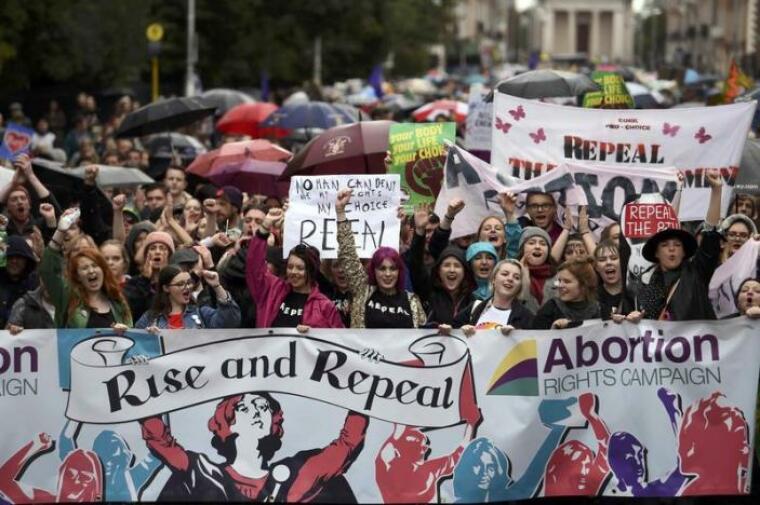Irish Citizens' Assembly recommends full repeal of law banning abortions

The Citizens' Assembly has voted to recommend a full repeal of Ireland's Eight Amendment, which gives equal rights to the mother and the unborn.
The Assembly, a body of 99 randomly selected people who are tasked with examining the Eight Amendment, voted on a series of questions on April 23 and 24, Life Site News reported.
In the first ballot, 87 percent voted to retain the amendment in full, while in the second ballot, 56 percent voted for the law to be amended or replaced. Fifty-seven percent voted in the third ballot to give the Oireachtas (Ireland's National Parliament) the power to legislate on abortion, compared to 43 percent advocating direct provision.
Almost two thirds of the Assembly voted in favor of decriminalization of abortions. Forty-eight percent voted to allow abortion in all circumstances in the first three months of pregnancy, while 44 percent voted to extend the limit to 22 weeks. Eight percent were not in favor of any limits based on gestational age.
Current law in Ireland prohibits abortions except in cases wherein the mother's life is at risk, including risk from suicide. In such cases, a three-person panel of doctors must determine whether the mother is really suicidal.
According to Vice News, more than nine Irish women travel abroad each day to have abortions, with a majority going to the United Kingdom. Their expenses could be as high as $1,600, although there are clinics in Britain that offer discounts for women from Ireland.
Pro-life groups said that the voting process was one sided, and was not reflective of the views of the majority of the Irish people.
The group known as the Pro Life Campaign lamented that the way the Citizens' Assembly voted for abortion without any prior debate or seeking expert advice was "farcical and wholly unacceptable."
Maria Madise, the international director of Society for the Protection of Unborn Children (SPUC), described the voting results as "appalling but not surprising."
"The process was flawed from the beginning, and was set up by the Irish Government to deliver a decision calling for a referendum on abortion but keeping the process at arms length from the government," said Madise.
"The right-to-life is the most fundamental of all human rights and is recognised by international law. No state, no legislature, regardless of public opinion, can abrogate or deny fundamental human rights. Therefore, all calls to hold a referendum must be rejected by Irish lawmakers and by the Irish people, because the right-to-life is non-negotiable and can never be subject to a vote," she added.
 Christians don't have to affirm transgenderism, but they can’t express that view at work: tribunal
Christians don't have to affirm transgenderism, but they can’t express that view at work: tribunal Archaeology discovery: Medieval Christian prayer beads found on Holy Island
Archaeology discovery: Medieval Christian prayer beads found on Holy Island Presbyterian Church in America votes to leave National Association of Evangelicals
Presbyterian Church in America votes to leave National Association of Evangelicals Over 50 killed in 'vile and satanic' attack at Nigerian church on Pentecost Sunday
Over 50 killed in 'vile and satanic' attack at Nigerian church on Pentecost Sunday Ukrainian Orthodox Church severs ties with Moscow over Patriarch Kirill's support for Putin's war
Ukrainian Orthodox Church severs ties with Moscow over Patriarch Kirill's support for Putin's war Islamic State kills 20 Nigerian Christians as revenge for US airstrike
Islamic State kills 20 Nigerian Christians as revenge for US airstrike Man who served 33 years in prison for murder leads inmates to Christ
Man who served 33 years in prison for murder leads inmates to Christ


 Nigerian student beaten to death, body burned over ‘blasphemous’ WhatsApp message
Nigerian student beaten to death, body burned over ‘blasphemous’ WhatsApp message 'A new low': World reacts after Hong Kong arrests 90-year-old Cardinal Joseph Zen
'A new low': World reacts after Hong Kong arrests 90-year-old Cardinal Joseph Zen Iran sentences Christian man to 10 years in prison for hosting house church worship gathering
Iran sentences Christian man to 10 years in prison for hosting house church worship gathering French Guyana: Pastor shot dead, church set on fire after meeting delegation of Evangelicals
French Guyana: Pastor shot dead, church set on fire after meeting delegation of Evangelicals ‘Talking Jesus’ report finds only 6% of UK adults identify as practicing Christians
‘Talking Jesus’ report finds only 6% of UK adults identify as practicing Christians Mission Eurasia ministry center blown up in Ukraine, hundreds of Bibles destroyed: 'God will provide'
Mission Eurasia ministry center blown up in Ukraine, hundreds of Bibles destroyed: 'God will provide' Church holds service for first time after ISIS desecrated it 8 years ago
Church holds service for first time after ISIS desecrated it 8 years ago Burger King apologizes for 'offensive campaign' using Jesus' words at the Last Supper
Burger King apologizes for 'offensive campaign' using Jesus' words at the Last Supper Uganda: Muslims abduct teacher, burn him inside mosque for praying in Christ’s name
Uganda: Muslims abduct teacher, burn him inside mosque for praying in Christ’s name